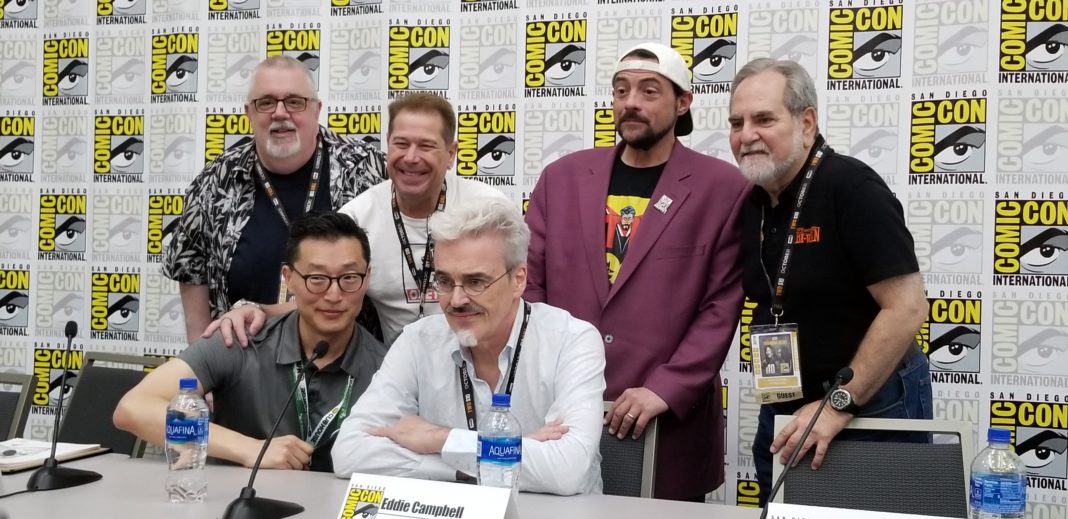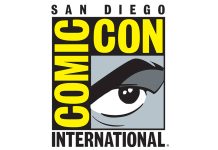By Gabriel Neeb
As part of its 50th anniversary celebration, San Diego Comic-Con has been holding panels dedicated to its history, featuring many of the people that lived it. To celebrate its most recent decade, Comic-Con in the 2000s, moderator Kurt Busiek (Astro City) hosted Gene Ha (Top 10), Eddie Campbell (From Hell), Billy Tucci (Shi), Steve Sansweet (Lucasfilm Limited), and Kevin Smith (Mallrats) to talk about everything they saw in that decade where Comic-Con became a cultural behemoth.
Busiek admitted he was an odd choice for such a panel, since he doesn’t do a lot of moderating and he spent most of the years since 2000 away from Comic-Con. But he had notes to describe the con since 2000, where it hosted 48,500 attendees… to 2009 where it hosted 126,000 attendees (and topped out at the number shortly thereafter).
The panel was mostly dedicated to the cool stories of the decade. Ha had been attending since 2000, where he won an Eisner, and got to meet Will Eisner when he accepted the award. Campbell had been going for 30 years; Tucci since 1993 when he decided, after not being hired, to do his own comic, and then attended in 1994 to great acclaim for that self-published work.
Sansweet told stories of how he helped return Star Wars to Comic-Con in 1996 after convincing the Lucasfilm heads to allow it and Smith bragged about his first SDCC in 1995, where he premiered his second film Mallrats at the UA Horton Plaza with a few of the panelists (and the writer of this piece) in attendance. Smith brought a unique perspective to the panel, as he somehow became a con fixture with his panels that started in 2002, and after 2005, were moved to night time since SDCC was “a family show,” as described to him by Con organizers.
Campbell was asked about favorite memories, but said that in a panel on Saturday, he used up his good ones… so Busiek had to give permission to tell a couple. He recounted a request for a sketch from one fan, but the fan had to buy something first. So the cheapest item ($3.99) was purchased, and a request was made for a sketch of the fan, as Jack the Ripper, being killed by a London prostitute. Campbell complied, and finished with a word balloon of Mary Kelly saying, “Take that, you cheap bastard!”
Near as he could tell, the fan didn’t really mind.
Tucci was jokingly asked to top that.
He did.
In 2009, as part of the promotion for the graphic novel Sgt. Rock: The Lost Battalion, members of the 442nd Regimental Combat Team — a unit made up of Japanese-Americans during World War II — attended with Tucci, including one Medal of Honor recipient. Tucci recounted long lines of fans who waited to meet these veterans and then later, at dinner, Tucci and that group met the cast of the 2008 Hellboy movie at dinner, where a similar sentiment was expressed. The audience in the panel broke into a vigorous applause.
Sansweet, as part if his Lucasfilm duties, recounted a good experience and a… bad experience. In 1998, a LFL executive attended to see the con’s reaction to Episode I footage… but it couldn’t be played because the one person with the key to operate the projector was gone for almost an hour (the footage was played the next day).
Sansweet also recalled how in 2004, the title for Episode III (Star Wars films always hold a great mystique and command attention for title reveals alone) was introduced with a trailer counting down all the titles from the 1977 film to Episode III: Revenge of the Sith. Following the trailer, Sansweet would cement the fact by removing a sweater with a T-shirt he was wearing that displayed the title. At Sansweet’s announcement that the same shirt was on sale on the floor, his room emptied as fans rushed to get the shirt.
At this point, since Ha had to leave early, the panel took a group photo break before the question and answer period. 
Busiek resumed by mentioning that his first con was in 1980, where attendance was 4,000. By his reckoning, “Heaven has grown.” He listed a handful of milestones reached by Comic-Con in the 2000s, ending with the first Marvel Studios panel in 2007 in Hall H, and we never looked back.
The Q&A session began with one person talking about how great the Crossgen booth was, and about how everyone he knows has had some problem with security — an experience shared by every. Person. In. The. Room. That included Ha who, trying to arrive at the convention center early, had to resort to line jumping when he encountered extra aggressive security guards in order to make a meeting.
Another question asked if there were any moments that showed the panelists if they think the show had grown beyond its original scope.
Smith recounted when the 2015 Star Wars panel took all 6,000 of its Hall H attendees to a concert (emptying that hall took an hour). Smith’s panel took place after, and his entire audience disappeared, provoking an apology from The Force Awakens director J.J. Abrams (they took a selfie together as a way of smoothing things out).
Busiek made an attempt at a lighter note, he recounted how professionals often joked that the con was attracting more attendees than there were people buying comics. Except, now, that is the case.
Campbell opined an interesting take on osplay culture that he’s seen rise of 30 years of attending conventions: where he used to be against it as he saw it impinging on the territory of creators, he now sees it as an attractive kind of thing to get people into the comics culture.
The next question came from someone who attended Smith’s 2015 panel, who wondered if the influx of other media (movies, TV, video games et al) was hurting SDCC. The panel agreed none of that is going anywhere.
Maybe the first big jump in perception was the presence of Twilight, which began in 2008 and attracted lots of outside attention and anger from certain fans (that Twilight star Robert Pattinson is the new Batman went unmentioned). The panel of professionals was unmoved by the anger and accepted it as a part of growing the culture.
Perhaps the worst event recalled was the stabbing in Hall H in 2010, just a few hours before the cast of The Avengers was introduced at the Marvel Studios panel.
Busiek finished the Comic-Con in the 2000s panel by repeating the fact that the first Comic-Con guests included Ray Bradbury and Forrest J. Ackerman, to underscore that Comic-Con has always, and will always, include other, non-economic media.









Comments are closed.